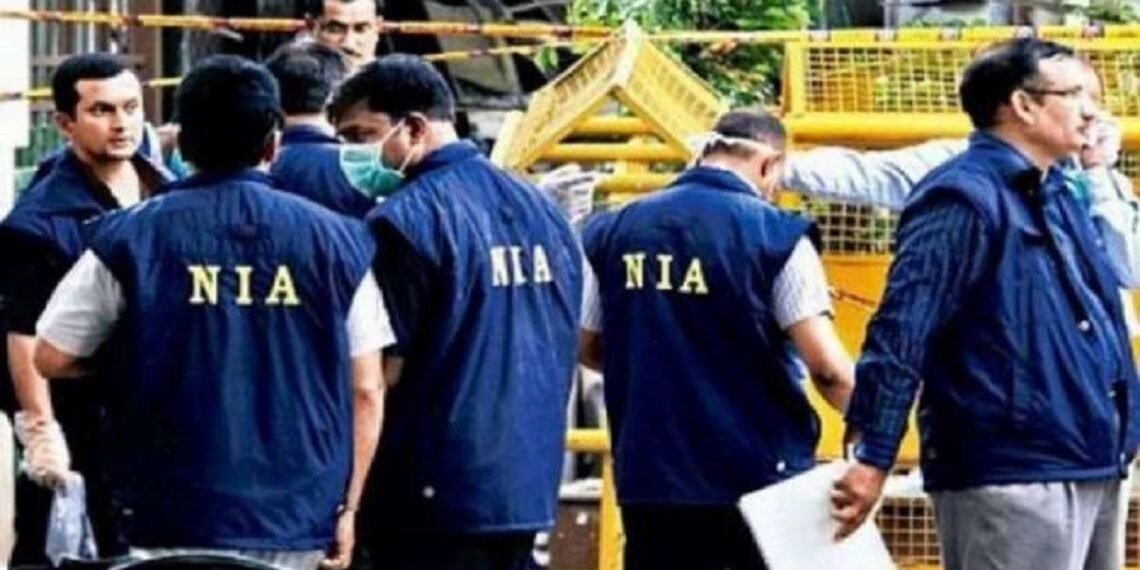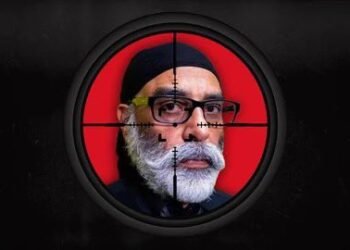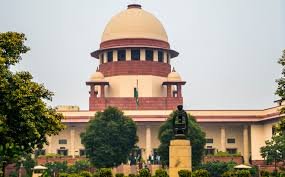In this second part of our five-part series on the Thangminlen Mate case and its broader implications, we focus on how Advocate Alongbar Basumatary systematically dismantled the NIA’s prosecution, exposing critical weaknesses in their terror narrative and the legality of Mate’s arrest. His methodical approach highlighted procedural irregularities, a glaring lack of concrete evidence, and the misapplication of legal provisions. The Editor
BY Navin Upadhyay
On June 19, 2025, a dramatic turn of events unfolded in the case of Thangminlen Mate (alias Lenin Mate), a Kuki Inpi leader from Moreh in Manipur. Just a day after the Special NIA Court in Guwahati granted him bail due to significant procedural lapses in his initial arrest, Mate was re-arrested by the National Investigation Agency (NIA) as he stepped out of prison. This swift re-arrest followed a thrilling courtroom drama that exposed critical “chinks in the NIA’s armor.” The legal proceedings involving Mate have consistently brought the investigative methods and legal justifications used by the country’s top anti-terror agency under intense scrutiny.
Mate, initially arrested on May 19, 2025, in connection with the deadly Moreh ambush of January 17, 2024, has been at the center of this high-stakes legal battle. His counsel, Advocate Alongbar Basumatary, orchestrated a masterful defense, systematically exposing the weaknesses in the NIA’s prosecution. Basumatary’s strategy focused on demonstrating procedural irregularities, a glaring lack of concrete evidence, and the misapplication of legal provisions, compelling the court to question the very foundation of the NIA’s case against his client.
READ: Special Report | The Mate Case (Part 1): NIA Goof-Up, Bail, and Rearrest
READ: After China’s Outburst, MEA Distances Itself from Rijiju’s Dalai Lama Succession Remarks
Mate faced a barrage of serious charges, including multiple sections of the Indian Penal Code (121, 121A, 302, 307, 353, 400, 325, 34), Section 25(1-C) of the Arms Act, Sections 3 and 4 of the Explosive Substances Act, and most notably, Section 16 of the Unlawful Activities (Prevention) Act (UAPA). The original FIR (No. 25(1)/2024) from Moreh Police Station was taken over by the NIA on February 9, 2024, and re-registered as RC-05/2024/NIA/IMP.
Background: A Gruesome Attack in a Tense Climate
The charges against Mate stemmed from a violent ambush on January 17, 2024, at approximately 3:30 PM, targeting an Indian Reserve Battalion (IRB) post at Ima Kondong Lairembi, Moreh. Alleged Kuki militants, armed with firearms and bombs, engaged security forces in a gun battle that spilled into Moreh Bazar. The attack tragically resulted in the death of Rifleman W. Somorjit Meetei and injuries to Songsuathui Aimol and Md. Abdul Hasim, both from the 3rd IRB. This incident occurred against the backdrop of persistent ethnic clashes between the Kuki and Meitei communities, intensifying the already volatile atmosphere in the region.
Advocate Alongbar Basumatary adopted a methodical approach, systematically exposing the weaknesses in the NIA’s prosecution. His strategy focused on demonstrating procedural irregularities, lack of concrete evidence, and misapplication of legal provisions, all aimed at proving the unlawfulness of Mate’s arrest and his continued custody.
- Mate’s Personal Background: Not a Fugitive, but a Teacher
Basumatary initiated his defense by presenting Mate’s personal circumstances, painting a picture that sharply contrasted with the NIA’s narrative of an absconding militant. He highlighted that Mate, a Master of Arts degree holder, is a schoolteacher at a private institution in Moreh and is recognized for his social activism within the local community. Far from evading authorities, Mate was accompanying his sister, Chinneivah Mate, to Aizawl for her UPSC Preliminary Examination, scheduled for May 25, 2025, when he was apprehended. The defense further emphasized Mate’s respected standing in the community, noting his father is the Gaonbura (village head) of HT Gamnomphai village. Basumatary asserted that no evidence had been presented to suggest Mate’s involvement in any anti-national or anti-social activities.
- No Material Evidence, No Forensic Link
A critical point of the defense was the complete absence of any incriminating material directly linking Mate to the Moreh attack. Basumatary underscored that the NIA had failed to recover any arms, explosives, maps, documents, communication devices, or other tools typically associated with terrorist activities from Mate’s possession. He argued that the items seized during Mate’s arrest were merely “usual things used by normal human beings in their day-to-day life.” The only purported basis for Mate’s arrest, according to the defense, were uncorroborated oral statements from Manipur Police Commando personnel who merely “disclosed the name of the present accused as a suspected person” without naming any specific organization or providing independent evidence.
- Unlawful Application of UAPA: Where Is the Terror Group?
Advocate Basumatary vehemently challenged the applicability of Section 16 of the UAPA, which pertains to committing terrorist acts. He argued that this section cannot be invoked without clearly identifying a banned terrorist organization responsible for the act. Crucially, the FIR in this case did not name any such organization, nor is any Kuki militant group currently listed in the First Schedule of the UAPA as a proscribed entity. Basumatary contended that “mere allegations against a community or a loose mention of ‘Kuki militants’ does not qualify for invoking the UAPA,” stressing that the law demands specificity and clarity, not assumptions or generalized accusations.
- An Illogical Conspiracy: Kuki-Meitei Alliance?
The defense highlighted a fundamental flaw in the NIA’s conspiracy theory. The FIR alleged that Mate, as part of a group of “Kuki militants,” participated in the ambush. However, Basumatary pointed out the inherent illogicality of this assertion given the severe and ongoing ethnic violence between the Kuki and Meitei communities in Manipur. He emphasized that during this period of open and often violent conflict, the idea of a Kuki and a Meitei (specifically, Waikhom Rohit, another suspect named in the same incident, who is Meitei) carrying out a joint ambush on security forces was “inconceivable.” This implausible narrative, according to the defense, significantly undermined the entire charge.
- Fundamental Rights Violated: Article 22(1) and BNSS Sections 47–48
Perhaps the most potent aspect of the defense’s argument centered on the blatant violation of Mate’s fundamental constitutional rights and statutory mandates. Basumatary cited Article 22(1) of the Indian Constitution, which unequivocally states that every person arrested must be:
- Informed immediately of the grounds for arrest; and
- Allowed to consult and be defended by a legal practitioner of their choice.
Furthermore, he invoked Sections 47 and 48 of the Bharatiya Nagarik Suraksha Sanhita (BNSS) 2023. Section 47 requires the arresting officer to communicate the grounds of arrest in writing, while Section 48 mandates that this information be shared with the accused’s family, friend, or nominated person.
Basumatary meticulously argued that the NIA failed on all these counts:
- No written communication of the grounds for arrest was provided to Mate.
- His relatives were not informed of his arrest.
- No document was produced before the court to demonstrate compliance with these mandatory safeguards. He forcefully declared Mate’s arrest as “arbitrary and unconstitutional,” and warned that such non-compliance renders the detention invalid.
READ: Mathura Mosque Not Disputed Structure, Says Allahabad HC
- Precedents Cited: Supreme Court and Gauhati High Court Rulings
To bolster his arguments, Basumatary cited several landmark judgments, demonstrating a consistent judicial stance on the importance of due process and constitutional safeguards:
- Pankaj Bansal vs Union of India (Criminal Appeal Nos. 3053–3054 of 2023): The Supreme Court explicitly held that grounds of arrest must be furnished in writing.
- Prabir Pukayastha vs State (NCT of Delhi) (D.No. 42896/2023): The court drew a crucial distinction between “reasons” and “grounds” of arrest, ruling that both must be clearly communicated in writing.
- Vihaan Kumar vs State of Haryana (SLP (Crl.) No. 13320 of 2024): This ruling reiterated that failure to comply with Article 22(1) constitutes a violation of personal liberty.
- Lalruhlu Hmar and Anr. vs Union of India (BA No. 116/2025) and Mahbubul Hoque vs State of Assam (BA No. 563/2025): The Gauhati High Court, in these cases, specifically held that non-communication of arrest grounds to family members or nominated persons renders the arrest unconstitutional.
- Final Plea: Liberty, Proportionality, and Human Suffering
Basumatary concluded his arguments with a compelling appeal that blended legal reasoning with humanitarian considerations. He highlighted that Mate is a married man with three minor children and the sole breadwinner for his 61-year-old father, the village chief. He argued that Mate’s continued detention, without any credible evidence to support the severe charges, would serve no purpose other than to inflict undue suffering on an innocent family. While acknowledging the stringent bail provisions under Section 43D(5) of the UAPA, Basumatary stressed that these provisions cannot override the Constitution, especially when fundamental due process has been disregarded.
⚖️ Summary of Legal and Procedural Loopholes in NIA’s Case (Pointwise), as Argued by Counsel:
- No Specific Terror Group Named: UAPA Section 16 was invoked, but no banned terrorist organization was identified in the FIR or complaint, which is a legal requirement for the section to apply.
- Contradictory Ethnic Narrative: The FIR alleges joint involvement of Kuki and Meitei individuals in the attack. Basumatary argues this is implausible during ongoing communal conflict between the two groups.
- Solely Based on Police Commando Statements: The accused was arrested based only on oral disclosures by Manipur Police commandos—no independent verification, forensic evidence, or electronic records provided.
- No Incriminating Evidence Seized: Nothing unlawful was recovered from Mate. Items seized were “ordinary objects of daily use,” with no direct link to the alleged militant attack.
- No Attempt to Evade Law: Mate was not absconding or hiding. He was accompanying his sister for a UPSC exam in Mizoram at the time of arrest, indicating no flight risk or suspicious behavior.
- Violation of Article 22(1) of Constitution: Mate was not informed in writing of the grounds of arrest, nor was his family or nominated contact informed, violating his fundamental right to know the reason for detention.
- Violation of BNSS Sections 47 & 48: These sections mandate immediate written communication of arrest grounds and notification to relatives/friends. No such documentation was produced by the investigating agency.
- Misidentification and False Equivalence: The counsel pointed out that another person (Waikhom Rohit)—a Meitei—was identified as involved in the same attack, raising doubt about Mate’s role and suggesting false implication due to his Kuki identity.
- Arbitrary Application of Stringent Bail Norms: While Section 43D(5) of UAPA restricts bail, the counsel argues that constitutional rights under Part III must prevail, especially in cases of arbitrary arrest without proper procedure.
- No Judicial Sanction or Evidence of Prima Facie Guilt: The arrest is described as premature, based on conjecture, and unsupported by evidence warranting prolonged detention under such serious charges.
The Special Judge, after considering the comprehensive arguments presented by Advocate Basumatary, acknowledged the significant procedural lapses in executing the arrest and granted him bail. But the NIA re-arrested Mate as he walked out of the prison. Subsequently, the Manipur police also arrested him on June 24.














